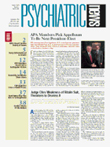Psychiatric educators were abuzz with information about recent changes in workforce and recruitment issues in psychiatry at a recent retreat of APA’s Council on Medical Education and Career Development.
APA leadership, council members, and experts in psychiatric education discussed two key changes—new exam requirements adversely affecting international medical graduates (IMGs) and the new core competencies established by the Accreditation Council on Graduate Medical Education (ACGME) in 1999.
Several speakers spotlighted issues related to international medical graduates (IMGs). Gerald P. Whelan, M.D., vice president of the Skills and Assessment Program for the Educational Commission for Foreign Medical Graduates (ECFMG), spoke about the recent decline in the numbers of IMGs available to enter graduate medical education. Attorney Stephen M. Perlitsh spoke about some of the difficulties encountered by IMGs who apply for visas to obtain U.S. graduate medical education. The chair of the Council on Medical Education and Career Development, Nyapati Rao, M.D., spoke about unique hardships encountered by IMGs from medical school into psychiatric practice. Immigration issues, communication problems in residency training, and licensure difficulties in practice adversely affect the careers of IMGs, according to Rao.
Other topics included APA’s Scope of Practice Survey, presented by APA Past President Allan Tasman, M.D., and U.S. medical interest in psychiatric careers, presented by Sidney Weissman, M.D. Various council members discussed workforce shortages affecting psychiatric subspecialty fields, including child and adolescent psychiatry and addictions psychiatry.
APA President-elect Richard Harding, M.D., announced that he will be taking the lead on a strategic planning process to address workforce and recruitment issues in psychiatry.
The strategic plan will also address the new residency core competencies, which will be incorporated over the next five years and will measure the competency of U.S. medical graduates in specific areas. These include patient care, medical knowledge, practice-based learning and improvement, interpersonal and communication skills, professionalism, and systems-based practice.
“One of APA’s goals,” Harding told Psychiatric News, “is to join with other organizations, like the American Association of Directors of Psychiatric Residency Training, to find the best medical students and give them a superb training in psychiatry that will prepare them for the 21st century. I am proud that psychiatry has recruited a high-quality and diverse group of residents to serve our changing population.” ▪

